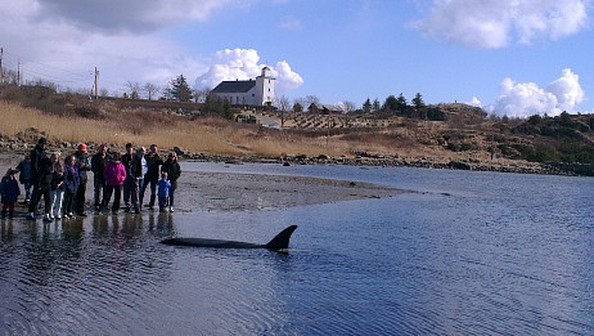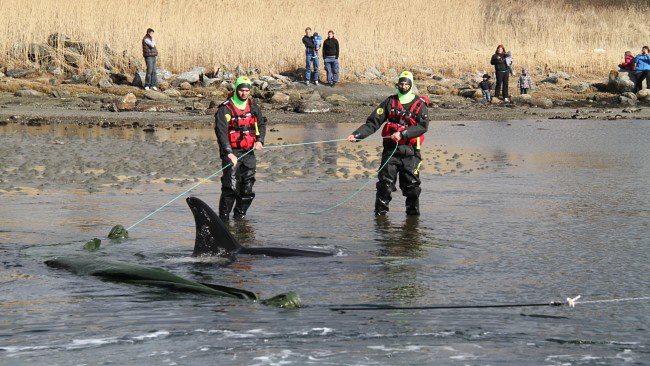|
Local firecrews, police and wildlife committee members from Karmøy, Norway, spent
yesterday afternoon trying to refloat a stranded orca. From Google translating an online article from Haugesunds Avis, it is our understanding that the animal has been moved from shallow to deeper waters, but has still not left the bay. "Together with a crew from Karmøy fire department they worked for several hours Sunday afternoon, after receiving news around 14.00 o’clock about the stranded orca. The orca had then swum into the shallows and got stuck there. The crew from Karmøy dressed up in dry-suits and managed to get a tarpaulin underneath the animal, and thus pull it off the beach." ("Sammen med mannskap fra Karmøy brannvesen jobbet de i flere timer søndag ettermiddag, etter at meldingen om den strandede spekkhoggeren kom i 14-tida. Da hadde han svømt inn på grunna, og ble liggende bom fast i strandkanten. Mannskaper fra Karmøy brannvesen kledte seg i tørrdrakter, og jobbet en presenning under havdyret. På den måten klarte de å dra den av grunn.") Officials considered shooting the orca, but decided against it after no external injuries were found on the animal. However, it does appear that if the killer whale has not left the bay today (Monday), they will reconsider euthanasia as an option. “'It seems like it is exhausted and needs to rest. If it has not managed to get out and into the fjord by Monday, I’m afraid we’ll have to shoot it,' says Sigurd Langåker, member of the board of wildlife management in Karmøy." ("Det virker som om han er utmattet, og trenger å hvile litt. Hvis den ikke har kommet seg ut i fjorden til mandag, må vi nesten skyte den, forteller Sigurd Langåker i viltnemnda på Karmøy.") Orca Aware has been in contact with marine mammal rescue charity British Divers Marine Life Rescue and here is what operations manager Stephen Marsh had to say about killer whale strandings: "It is very rare for orca to strand and in the UK we will only see them (strand) once every 10-12 years. Obviously where there is a larger population strandings may happen more frequently. Even so it is usually found that individuals that strand or are in danger of stranding are usually compromised in some way, whether caused by natural or anthropogenic influences." For the full article, please visit http://www.h-avis.no/nyheter/spekkhogger-far-ligge-pa-grunn-til-mandag-1.7836414 and for more information, please visit: http://www.nrk.no/nyheter/distrikt/rogaland/1.10976720 A big thank you to journalists Elizabeth Batt and Candace Calloway Whiting for sharing this information. Candace reminds us that Norway is the birthplace of wild-caught captive killer whale Morgan who currently resides in marine entertainment park Loro Parque (Tenerife): http://blog.seattlepi.com/candacewhiting/2013/04/07/an-orca-stranded-in-norway-home-of-the-captive-orca-morgan-please-keep-this-one-free/ Morgan was captured from shallow waters off the coast of the Netherlands in 2010, under a rehabilitation and release permit. However, she has been held in captivity ever since, despite on-going court battles between the expert orca scientists who have found much evidence to suggest that Morgan is a suitable candidate for rehabilitation and release, and the for-profit marine park directors who disagree. For more information, please visit: http://www.freemorgan.org/ Orca Aware would like to thank supporter Rebecca Hornli Lundberg for her help with article translations.
1 Comment
|
Archives
January 2017
|



 RSS Feed
RSS Feed
